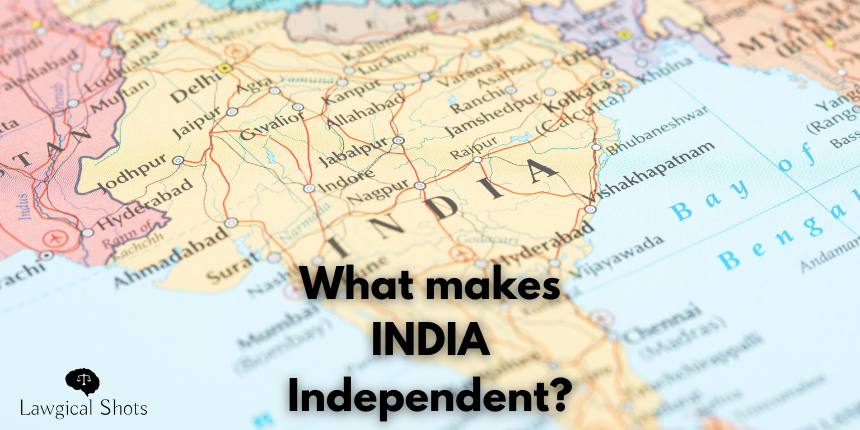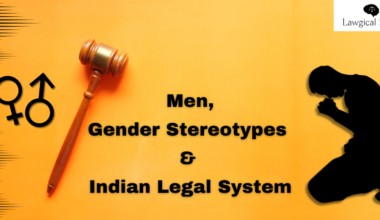We celebrate Independence Day every year on 15 August. Since a couple of years, hoisting our national flag has become a trend which boosts our patriotism to the next level. During school days, the rehearsals for cultural and other events like dance, singing, parade, etc. would commence with the month. On the D-Day, everyone would get those laddus/bananas/Parle-G biscuits……such lovely memories. India became free in 1947, but what are those things which make us a free nation? What makes India an independent country? What is it that distinguishes British India from free and Independent India? Here, we take this opportunity to address the various aspects which reflect India’s freedom and uphold its superiority as a nation.
What makes India Independent?

Constitution of India
Most of the countries across the world are governed by a grundnorm, a legal document which takes care of the various crucial aspects of how a country shall be ruled. In India, the first such document was the Government of India Act, 1935. While the same did lay the rule regarding governance in India, the British remained the rulers. Since India became independent in 1947, a Constituent Assembly took charge of framing the Constitution of India. Some parts of the same came into force on 26 November, 1949, and in whole on 26 January, 1950. What makes India independent is mostly reflected in the Constitution of India. While amendments keep the document alive, the basic structure of the Indian Constitution cannot be touched or disturbed.

Defined Territory
Independent India has a defined territory. What makes India independent is its territory, the defined area within which the laws are applicable, the people are called Indians, the resources are freely enjoyable by Indians, and there are specific rights for fellows to enjoy. While localities may enjoy certain privileges, every Indian is equal on the Indian territory.

Sovereignty
Starting off with the literal meaning, sovereign means having absolute or supreme power. For a country to be independent, the first and foremost requirement is sovereignty. It means that the country is capable of taking its own decisions, and nobody can decide on behalf of that country. When India was being ruled by the British, they were the rule makers, they decided how India was governed, they decided on behalf of Indians. Sovereignty is another trait of what makes India an independent country. The Preamble to Constitution of India mentions India being a sovereign.

Elections
The Constitution of India provides for adult suffrage and right to vote, in short, about elections. It lays the process to be followed during elections. What makes India independent is that the elected persons get to decide whether people will be elected through a Electronic voting machine or a ballot paper, and not outsider has a call on the process to be followed. Elections are regarded as a national festival in India, because they strengthen the democracy, the Independent India.

Framing and Implementing Laws
Nobody but Indians should have the right to make laws for Indians. Existence of Parliament, formation of Central and State Legislature, other local rule making authorities at lower levels. When ruled by the British, the taxes, the criminal laws, the other rules of who is allowed in the special trains, everything was decided by the British rulers. Now what makes India independent is the rule making authority, where we have opted for being a democracy, where people are elected of the people, for the people and by the people. They are the lawmakers, and implementation of those laws is also taken care of. Powers are divided among the Legislature and Executive – President, Lok Sabha, Rajya Sabha, State Governors, State Legislatures, etc. Amendments or new laws are proposed by some, need a majority in the house(s), and then need approval by the President or Governor, as the case may be.

Treaties in India’s Name
India as a State is a separate entity in the eyes of law. Thus, any treaties, contracts or conventions are signed in the name of the President of India on behalf of the country. In fact, India can sue and be sued under the specific laws. What makes India independent is this trait of signing treaties as a legal person. No one else can interfere with India’s power in this regard.

Independent Judiciary
Have you seen one of those judges wearing white hair wigs with black gowns, that was a reality in Indian Courts as well, when India was under British Rule. The laws were British, and the legal disputes were mostly decided by the British. With India becoming independent, India got its own Judicial system. While we have some sort of common law to follow, we have our own judges who are not imposed on us but enter the judicial system by passing the specific criteria of judiciary exams. Judiciary has a crucial role to play in what makes India independent. Indian Courts decide the legal matters among Indians, or disputes that arise on the Indian territory.

Financial Independence
When a person starts earning, he/she is regarded as financially independent, to decide how to spend the money earned, enter debts, give loans, etc. What makes India an independent country is its ability to collect taxes by the government elected by the people, which also gives away loans imposing specific interests, has separate funds for contingency/emergency, and also incurs debts when necessary. There is a provision for Financial Emergency under the Constitution of India, but we are lucky enough that even after having spent more than 75 years as independent India, the same was never imposed.
Post Independence Challenges
While we all know that India is independent, each trait of independence covered above has had its own difficulties. It may seem that since 1947, India has had a smoother pathway, being a developing country aiming towards a stronger economy. However, disasters keep hitting India as a country. Let’s take a closer look at what it means:
- The Constitution of India is the grundnorm which works as a torchbearer, whether it is about people’s rights, or who remains in charge of this diverse nation. But there have been times when the government sought to disembody its soul by handing over unlimited powers to the government to break and twist the extent of the Constitution. However, the Top Court came up with the “Basic Structure Doctrine” and drew the lines, keeping in check those in power.
- When the British left, the soul of India was broken into two, and then three pieces, resulting in the birth of Pakistan, and Bangladesh later. Nobody set the dinner table and served the food. Our fighters, the leaders in charge, sketched the integration of princely states and colonial holdings to underline the extension of sovereignty across all territories, shaping the present day India.
- India was declared a Sovereign State in 1947. While India is all set to celebrate its 79th Independence Day, some so-called superpowers think that they have the authority to tell who India should be friends with, and continue its trade with. As a sovereign nation, Indians are not governed by anyone but those elected by us, within the confines of applicable laws.
- India is a democracy with the government elected of the people, for the people and by the people. However, the authenticity of elections in India have time and again been subjected to big question marks. Sometimes, it is the EVM/VVPAT, and the voter list the other times.
- Speaking of framing and implementing laws, sometimes it takes years for the government to codify certain legal aspects. Implementation is just another ridge on the pathway. Examples could range from Privacy laws, surrogacy regulations, etc.
- It’s not been long since the pictures and videos of burnt currency notes found at the residence of Delhi High Court Judge made headlines. While the matter is still awaiting a resolution, incidents like this induce a sizable knot on the Independence of Judiciary.
Did we miss out on anything? You can remind us by connecting with us on LinkedIn or sending an email at lawgicalshots@gmail.com.








